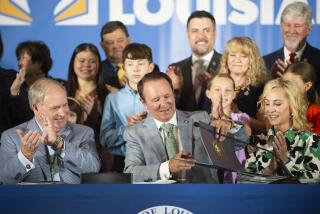ORANGE COUNTY VOICES : Government vs. Religion: Which Is the Higher Power?
- Share via
The Rev. Wiley Drake of the First Southern Baptist Church of Buena Park has much riding on a South Texas case that the U.S. Supreme Court will decide in the next few months.
Drake’s church has a biblical command to help the homeless. However, the Buena Park Planning Commission repeatedly has impeded a conditional-use permit for the church’s proposed shelter. Its many stringent conditions have included a “proselytizing” ban that would limit the church’s homeless ministry to physical, but not spiritual, needs. Drake also faces criminal charges for allowing the homeless to camp on church property.
The case that could have substantial implications for Drake and millions of Americans who want to act on their deep religious beliefs is Boerne vs. Flores, which was argued on Feb. 19. The case arose when the city of Boerne, Texas, prohibited St. Peter’s Catholic Church from enlarging its historic building. The issue is whether Congress had the constitutional authority to pass the Religious Freedom Restoration Act, which protects religious practices against government actions that substantially burden them. The court’s decision will have implications for whether city zoning laws can prohibit Bible studies in people’s homes or govern the design of Buddhist temples, or whether states can build roads through Native American sacred lands.
Flores had its genesis in another Supreme Court case, Employment Division vs. Smith, which held that the free exercise clause of the 1st Amendment does not prohibit “neutral” government actions that substantially burden religious practices. Under Smith, cities like Buena Park and Boerne could subject churches to strict, but generally applicable, zoning regulations, even if those churches could not act on the mandates of their faith or conform their buildings to their worship or ministry needs.
Smith received widespread criticism. A near-unanimous Congress responded by enacting the Religious Freedom Restoration Act, which had extraordinarily broad support ranging from evangelical Christians to the American Civil Liberties Union and President Clinton. The legislation requires that any government action which substantially burdens religious practices must be the least restrictive way of serving a compelling government purpose.
For example, if the Religious Freedom Restoration Act had been the law in 1990, it would have prohibited the Boston Landmark Commission from telling the Jesuits that they could not rearrange their architecturally significant chapel altar. But regulations that require fire escapes would be valid, as necessarily furthering compelling government interests in health and safety.
In Flores, the Religious Freedom Restoration Act is under attack for exceeding congressional power with respect to state governments, the courts and the establishment of religion. In other words, if the Supreme Court has said that the Constitution does not protect certain religious practices, can Congress protect them?
The possibility that the Religious Freedom Restoration Act could be invalid, and therefore governments could legally regulate or prohibit essential religious practices, is deeply troubling. Although government regulation is necessary to control the worst effects of human selfishness, we already see threats to the human quest for the divine, the eternal, the true and good, the redemptive. Cities use zoning laws to control chapel altars, prohibit prayer meetings in private residences, and exclude Muslim mosques. Believers outside the mainstream like the Sikhs or Amish are most vulnerable to discrimination.
Why should religious practice receive special protection? The 1st Amendment to the Constitution explicitly protects certain core factors that shape people’s identity against government coercion: our faith, ideas, complaints and associations. If we do not protect religious freedom, we threaten to sever the faithful from who they are as believers in the secular world.
The robust practice of religion in the United States also shapes a free and good society. If religion, which seeks moral truth and compassion, is subservient to politics, with its special interests and lapses of integrity, an important check on our political and social systems has been lost.
Unfortunately, courts have not been vigilant in protecting free exercise. They follow what Yale law professor Stephen Carter calls “the culture of disbelief.” American law generally tolerates private, quiet, docile belief and the abstract popularity of symbolic religion, but is hostile to specific religious activities that are unpopular or inconvenient to public policy. As a result, the free exercise clause becomes an empty guarantee of a second-class civil liberty. Drake’s case is a perfect example.
The Religious Freedom Restoration Act adds balance. Under it, a regulation is invalid only if it substantially burdens, not merely inconveniences, religious practices. And any regulation that is necessary to protect the public health and safety is valid, regardless of its effect on religion.
The real question is whether the court will jealously guard its authority to interpret the Constitution or share with Congress the power to protect religious freedom.
More to Read
Sign up for Essential California
The most important California stories and recommendations in your inbox every morning.
You may occasionally receive promotional content from the Los Angeles Times.










